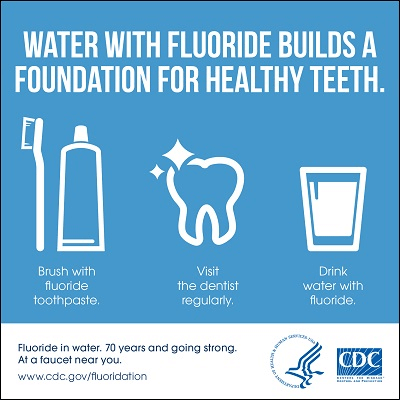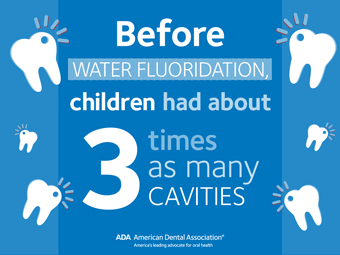 Occasionally, patients will ask for guidance with the use of fluoride as it relates to their dental care. I understand their concerns as there can be some misinformation about its risks. I have talked about the many benefits of fluoride use before and continue to remain a firm advocate of its responsible use based upon the extensive research conducted on this naturally-occurring compound. Per the American Dental Association (ADA): “More than 70 years of scientific research has consistently shown that an optimal level of fluoride in community water is safe and effective in preventing tooth decay by at least 25% in both children and adults. Simply by drinking water, Americans can benefit from fluoride’s cavity protection whether they are at home, work or school. The Centers for Disease Control and Prevention named community water fluoridation one of 10 great public health achievements of the 20th century.” (See https://www.ada.org/en/
Occasionally, patients will ask for guidance with the use of fluoride as it relates to their dental care. I understand their concerns as there can be some misinformation about its risks. I have talked about the many benefits of fluoride use before and continue to remain a firm advocate of its responsible use based upon the extensive research conducted on this naturally-occurring compound. Per the American Dental Association (ADA): “More than 70 years of scientific research has consistently shown that an optimal level of fluoride in community water is safe and effective in preventing tooth decay by at least 25% in both children and adults. Simply by drinking water, Americans can benefit from fluoride’s cavity protection whether they are at home, work or school. The Centers for Disease Control and Prevention named community water fluoridation one of 10 great public health achievements of the 20th century.” (See https://www.ada.org/en/
Opioids in Dentistry
 As the current opioid epidemic continues to grow and impact communities across our nation, one of the challenges I face as a dental provider is assisting my patients in very real pain while also considering the body of evidence linking opioid overprescription with addiction. To address this correlation, I’d like to briefly discuss the practices I have always followed in prescribing pain relievers. First, there are many compelling studies that show that taking Ibuprofen and Acetaminophen together at certain dosages are more effective than traditional opioid medications (see https://www.nytimes.com/2018/04/25/well/common-pain-relievers-beat-opioids-for-dental-pain-relief.html). Studies have examined the way in which these two medications, when taken together, amplify each other and become more effective at controlling pain. For many adult patients, a dosage of 600mg of Ibuprofen (3x Advil regular strength) and 650mg of Acetaminophen (Tylenol 2x regular strength) taken together every 5-6 hours can help to manage pain until we are able to determine the dental issue they may be experiencing, or during recovery post treatment.
As the current opioid epidemic continues to grow and impact communities across our nation, one of the challenges I face as a dental provider is assisting my patients in very real pain while also considering the body of evidence linking opioid overprescription with addiction. To address this correlation, I’d like to briefly discuss the practices I have always followed in prescribing pain relievers. First, there are many compelling studies that show that taking Ibuprofen and Acetaminophen together at certain dosages are more effective than traditional opioid medications (see https://www.nytimes.com/2018/04/25/well/common-pain-relievers-beat-opioids-for-dental-pain-relief.html). Studies have examined the way in which these two medications, when taken together, amplify each other and become more effective at controlling pain. For many adult patients, a dosage of 600mg of Ibuprofen (3x Advil regular strength) and 650mg of Acetaminophen (Tylenol 2x regular strength) taken together every 5-6 hours can help to manage pain until we are able to determine the dental issue they may be experiencing, or during recovery post treatment.
Opioids, although a good pain reliever, have some very nasty side effects. The most obvious effect of opioids is that they are incredibly addictive. National prescription policies have been linked with a substantial increase in opioid related deaths and higher levels of addiction nationwide. Long-term dependence on opioids, besides its damaging effects on the addicted individual’s quality of life as it relates to mental, social and financial considerations, can cause major health concerns, including nausea and vomiting, constipation, liver damage, brain damage due to hypoxia (depressed breathing) and in many cases, death. Opioids impair mental and physical activity and should be avoided in patients needing to drive or operate heavy machinery.
We understand that dental emergencies happen and pain is, unfortunately, a significant side effect of any oral condition. It has long been the policy of Cascadia Dentistry to only prescribe any opioid-containing medications as a last resort and only at minimal quantities. Our first line of pain management will continue to be the combination of Ibuprofen and Acetaminophen to help our patients manage their discomfort until we can assist with addressing the source of their pain through treatment at our office.
If you have any questions about this policy or how Cascadia is focused on reducing the risk of addiction in our communities, please do not hesitate to contact us to discuss further. For more information about our nation’s opioid epidemic, please see https://www.cdc.gov/drugoverdose/prescribing/guideline.html
Antibiotics For Treating Dental Patients With Artificial Joints Are No Longer Recommended
 In December 2012, the American Academy of Orthopedic Surgeons (AAOS) and the American Dental Association (ADA) collaboratively announced revised guidelines on the use of antibiotics as a means to prevent the infection of prosthetic joints. The most recent guidelines no longer recommend the routine use of antibiotics in most cases of patients with artificial joints. This revision to existing best practices has been slow to reach the general public. In summary, based on considerable research (https://www.ncbi.nlm.nih.gov/pmc/articles/PMC3927664/), antibiotics before dental procedures has not been found to be beneficial for the vast majority of patients with artificial joints and in many cases can actually be harmful.
In December 2012, the American Academy of Orthopedic Surgeons (AAOS) and the American Dental Association (ADA) collaboratively announced revised guidelines on the use of antibiotics as a means to prevent the infection of prosthetic joints. The most recent guidelines no longer recommend the routine use of antibiotics in most cases of patients with artificial joints. This revision to existing best practices has been slow to reach the general public. In summary, based on considerable research (https://www.ncbi.nlm.nih.gov/pmc/articles/PMC3927664/), antibiotics before dental procedures has not been found to be beneficial for the vast majority of patients with artificial joints and in many cases can actually be harmful.
This topic comes up fairly often in the dental chair as many of my patients have artificial joints. For years the guidelines have been moving toward the reduction of the use of prophylactic antibiotics before dental visits and the frequently changing opinions can often be confusing. The idea was that bacteria can enter your bloodstream during invasive dental procedures that could, potentially, after a torturous path, end up making their way into the joint space, resulting in a harmful infection of that prosthetic joint. If this theory were correct, the use of antibiotics as a means to prevent it could make sense. However, after years of research, they cannot find any cases where this has actually happened. At the same time, they have also found that simply brushing your teeth can also result in bacteria from your oral cavity entering your bloodstream; and yet, there are no recommendations for the use of preventive antibiotics before brushing teeth. After years of ongoing research, the AAOS and ADA have finally eliminated the general recommendation for the use of antibiotics in the case of prosthetic joints. Ultimately, however, their recommendation defers to the patient and their orthopedic surgeon to make the final decision.
If this topic applies to you, the Cascadia Dentistry team continues to defer to you and your surgeon and recommend that you talk with your surgeon about the revised guidelines. In both personal experience and in doing our own research, we have found evidence that scaling down the overuse of antibiotics is beneficial, as instances where they are over-prescribed can reduce their effectiveness or even lead to life-threatening digestive issues. As a result, we follow the guidelines of the ADA and the AAOS and do not routinely recommend the use of antibiotic prophylaxis for prosthetic joints. If you have any questions or concerns, please let us know at your next dental visit. We would be more than happy to discuss this with you further.
To schedule an appointment, please call Cascadia Dentistry in Stanwood: (360) 629-7229
Fluoride Supplements And Children
 I recently had a discussion with a friend of mine as I gave my son his daily fluoride drops. After I was done, my friend looked at me with a puzzled expression and asked me why I would give my son fluoride because she had heard that fluoride is toxic. As a dentist, I hear this view fairly often and it’s frustrating because I immediately want to start presenting all the research touting the major benefits of fluoride supplements in children without coming off as overbearing. In my friends’ case, I very confidently answered her that I was doing my son a favor by giving him fluoride supplements to reduce his future risk for tooth decay because our local drinking water is not fluoridated. Because this is such a common concern, I’d like to take a moment to further explain myself and offer a few points for parents of young children to consider.
I recently had a discussion with a friend of mine as I gave my son his daily fluoride drops. After I was done, my friend looked at me with a puzzled expression and asked me why I would give my son fluoride because she had heard that fluoride is toxic. As a dentist, I hear this view fairly often and it’s frustrating because I immediately want to start presenting all the research touting the major benefits of fluoride supplements in children without coming off as overbearing. In my friends’ case, I very confidently answered her that I was doing my son a favor by giving him fluoride supplements to reduce his future risk for tooth decay because our local drinking water is not fluoridated. Because this is such a common concern, I’d like to take a moment to further explain myself and offer a few points for parents of young children to consider.
So, what is fluoride and why would I give it to my child? What are the plusses and negatives of fluoride consumption? Fluoride is a naturally occurring element that can be found in trace amounts in water sources, some foods and many oral healthcare products. In fact, if you drink tea, you’re probably consuming fluoride and you don’t even know it!
To address my friend’s concerns – yes, fluoride can be toxic at high levels and if you or your child consume too much of it, too quickly, this can lead to a serious medical condition. But, toxicity is a funny thing. Many things such as medications are toxic at high levels and should receive the same warning. Advil, for instance, is a compound known to be toxic to the liver in high concentrations and should be taken as directed. Even table salt contains sodium and chloride; both essential for biologic function but also extremely toxic at high levels. Rest assured, the recommended dosing of fluoride in children is well studied and is far below its toxic level when used as directed.
The most common downside to fluoride consumption is a condition called fluorosis which is a condition that results in white spots in your teeth and bones. This can occur if you are swallow too much fluoride from too many sources such as toothpaste and mouth rinse. However, the fluorosis effect has been accounted for and in 2010, caused the American Dental Association to revise their dosing recommendations lower than they previously had been.
 On the other hand, dental decay is endemic and is a very serious health concern that many children and adults face. Dental decay can lead to pain and premature tooth loss and can be debilitating to many children and adults alike. Yet fluoride consumed as a child brings down that persons’ lifelong risk for dental decay in their permanent teeth. Simply put, a child who orally consumes fluoride at the recommended levels, results in fluoride integrating into that child’s adult teeth as they develop which helps reduce future risk for tooth decay – certainly a major benefit to that child as they age.
On the other hand, dental decay is endemic and is a very serious health concern that many children and adults face. Dental decay can lead to pain and premature tooth loss and can be debilitating to many children and adults alike. Yet fluoride consumed as a child brings down that persons’ lifelong risk for dental decay in their permanent teeth. Simply put, a child who orally consumes fluoride at the recommended levels, results in fluoride integrating into that child’s adult teeth as they develop which helps reduce future risk for tooth decay – certainly a major benefit to that child as they age.
A lot of research has been done on the benefits of fluoride consumption in children that has led many medical professionals and a handful of surgeon generals to recommend daily fluoride consumption in children. Based on extensive research, fluoride supplements are recommended by the American Dental Association for children under sixteen years of age that do not live in communities already served by fluoridated water – like Stanwood-Camano and Arlington. Additionally, if you consume bottled water or well water, you are also not consuming much, if any, fluoride.
The ADA has recommendations on what the right levels of fluoride consumption are based on age and exposure levels (0.25mg – 1.0mg a day depending on age and exposure). If you are a parent of a child under the age of sixteen, I strongly recommend you consider giving your children fluoride supplements. If you are concerned with the effects of fluoride, I would recommend you take a look at the following website: http://www.ada.org/en/public-programs/advocating-for-the-public/fluoride-and-fluoridation/fluoridation-facts. If you would like to talk about this as well as other ways to reduce you and your children’s risks for tooth decay, please give us a call to schedule an appointment – we’re here to help!
